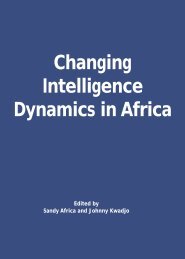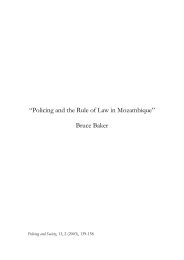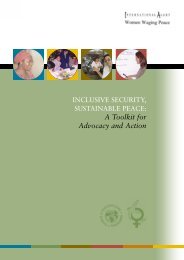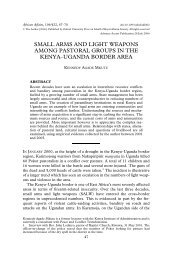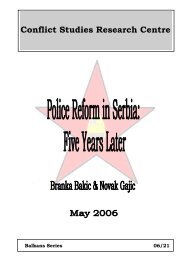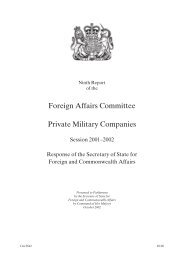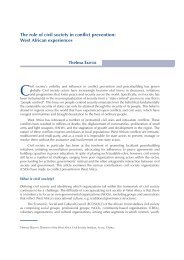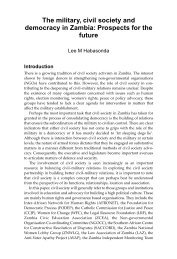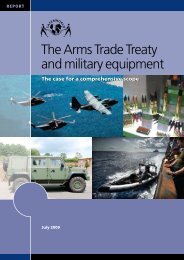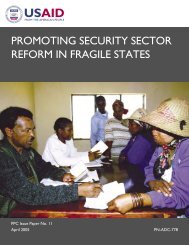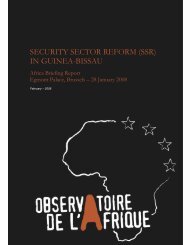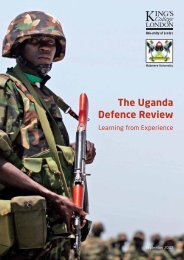AFGHANISTAN'S ELECTION CHALLENGES
AFGHANISTAN'S ELECTION CHALLENGES
AFGHANISTAN'S ELECTION CHALLENGES
You also want an ePaper? Increase the reach of your titles
YUMPU automatically turns print PDFs into web optimized ePapers that Google loves.
Asia Report N°171 24 June 2009<br />
AFGHANISTAN’S <strong>ELECTION</strong> <strong>CHALLENGES</strong><br />
EXECUTIVE SUMMARY AND RECOMMENDATIONS<br />
Afghanistan’s forthcoming elections, with presidential<br />
and provincial council polls on 20 August 2009,<br />
and National Assembly and district elections scheduled<br />
for 2010, present a formidable challenge if they<br />
are to produce widely accepted and credible results.<br />
The weakness of state institutions, the deteriorating<br />
security situation and the fractured political scene are<br />
all highlighted by – and will likely have a dramatic<br />
effect on – the electoral process. The years since the<br />
last poll saw the Afghan government and international<br />
community fail to embed a robust electoral<br />
framework and drive democratisation at all levels.<br />
This has made holding truly meaningful elections much<br />
more difficult. Rather than once again running the<br />
polls merely as distinct events, the enormous resources<br />
and attention focused on the elections should be<br />
channelled into strengthening political and electoral<br />
institutions, as a key part of the state-building efforts<br />
required to produce a stable country.<br />
The first round of post-Taliban elections in 2004 and<br />
2005 were joint United Nations-Afghan efforts. This<br />
time they will be conducted under the sole stewardship<br />
of the Afghan Independent Election Commission<br />
(IEC) with the UN acting only in support. Preparations<br />
face a series of intertwined challenges:<br />
Technical. The momentum of the last elections was<br />
lost in 2006-2007. The Afghan government, UN<br />
and donors failed to use the interim period to<br />
build the capacity and resources of the IEC;<br />
strengthen the legal framework including replacing<br />
the inappropriate Single Non-Transferable<br />
Vote (SNTV) system; and produce a sustainable<br />
voter registry. Further, failure and delays in wider<br />
institutional processes such as disarmament programs<br />
and judicial and police reform have increased<br />
popular disillusionment and thus reduced<br />
buy-in for the state-building agenda, including potentially<br />
election participation.<br />
Political. The presidential elections in particular<br />
expose a highly centralised political patronage<br />
system in which the head of state wields enormous<br />
powers, bringing personalities rather than<br />
policies to the fore. The poor relationship between<br />
the branches of the state sees the new legislature<br />
ignored or overruled and its effectiveness greatly<br />
reduced by the absence of a formal role for political<br />
parties. The lack of an accepted constitutional arbiter<br />
in case of dispute means that even simple<br />
technical electoral processes have become highly<br />
charged political contests.<br />
Security. The insurgency, centred in the south and<br />
east of the country, may affect the ability of people<br />
in such areas to freely exercise their franchise and<br />
makes scrutiny of the process much more difficult,<br />
increasing opportunities for fraud. This may<br />
have wider implications for overall legitimacy<br />
given that the violence is centred in areas dominated<br />
by one ethnic group, the Pashtuns. The failings<br />
of disarmament programs due to lack of political<br />
will also increases the chances of intimidation<br />
across the country. The continued low quality<br />
of police makes providing security for elections<br />
challenging.<br />
Proceeding with the polls is however widely recognised<br />
to be the least bad option. There are 41 candidates<br />
running in the presidential poll – most prominent<br />
in challenging Hamid Karzai are former foreign<br />
minister and leading Northern Alliance personality<br />
Abdullah Abdullah and former World Bank official<br />
and finance minister Ashraf Ghani Ahmadzai. The<br />
large number of candidates – about 3,300 (10 per<br />
cent of them women) – for the provincial councils<br />
provides ample evidence of continued interest in the<br />
process. The challenge now is to ensure credible and<br />
widely accepted results that promote stability.<br />
Participation is likely to be uneven with a drop in candidates<br />
in areas of the insurgency-hit south in particular,<br />
a stark reminder of the effect of violence. Expectations<br />
must not be inflated, but on the other hand the<br />
bar must not simply be lowered if there is to be faith<br />
in the result. The voter registration update, while adding<br />
some momentum to the process, failed to address<br />
striking flaws in the voter registry which could lay<br />
the groundwork for fraud and which the international



